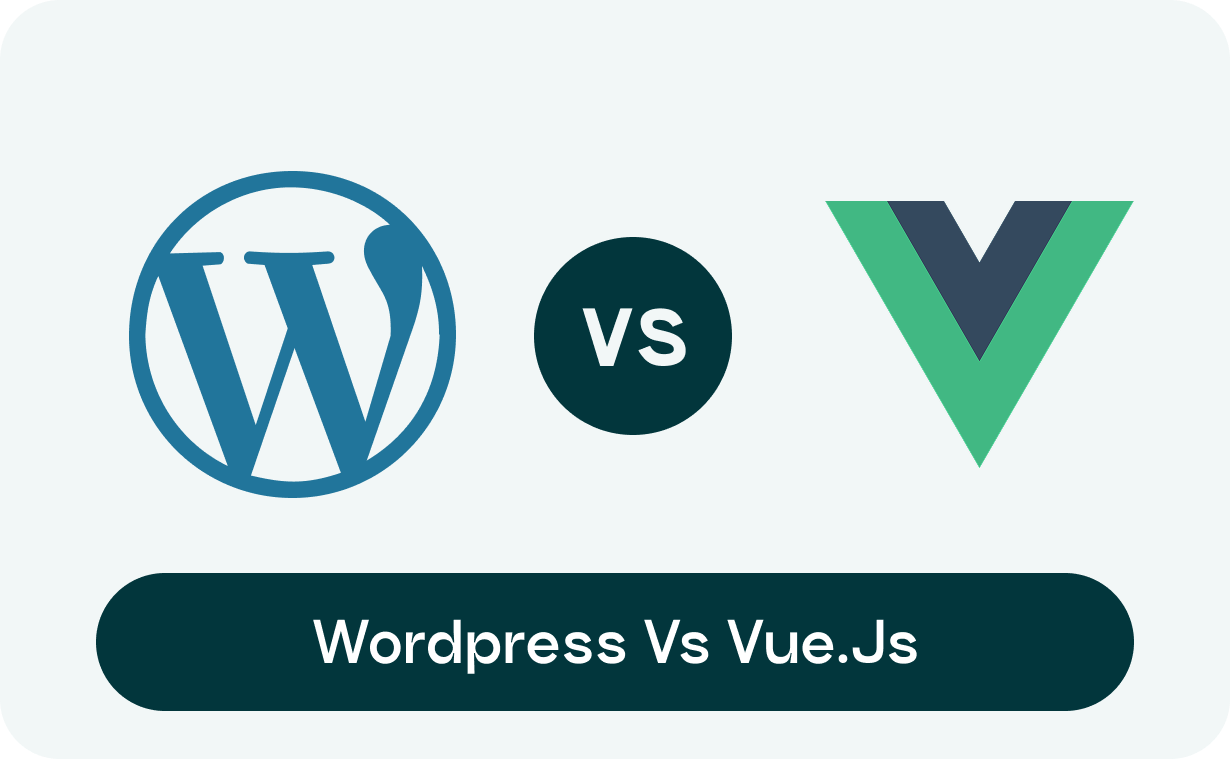Table Of Content
- Overview of WordPress
- Overview of Vue.js
- Feature Comparison Table between WordPress vs Vue.js
- Ease of Use - WordPress vs Vue.js
- Customization and Flexibility - WordPress vs Vue.js
- Performance - WordPress vs Vue.js
- SEO Capabilities - WordPress vs Vue.js
- Pricing - WordPress vs Vue.js
- Conclusion: Which Should You Choose between WordPress vs Vue.js?
- FAQs: WordPress vs Vue.js
Choosing between WordPress vs Vue.js depends on the type of website or web application you want to build. WordPress is a powerful content management system (CMS), while Vue.js is a JavaScript framework designed for building dynamic user interfaces. This guide will break down the differences between WordPress and Vue.js to help you make an informed decision.
Overview of WordPress
WordPress is an open-source content management system (CMS) that powers millions of websites. It is known for its ease of use, pre-designed themes, and plugins, which make it accessible to non-developers. WordPress is ideal for creating blogs, eCommerce sites, business websites, and portfolios without needing extensive coding knowledge.
Key Features of WordPress:
User-Friendly: An intuitive dashboard with drag-and-drop features.
Themes and Plugins: Thousands of themes and plugins available to extend functionality.
Content Management: Built for easy content creation, especially blogs and articles.
SEO-Friendly: Plugins like Yoast SEO help optimize content for search engines.
Scalability: Suitable for small blogs to large enterprise websites.
Overview of Vue.js
Vue.js is an open-source JavaScript framework used for building interactive user interfaces (UI) and single-page applications (SPA). Unlike WordPress, Vue.js does not come with a built-in content management system. It is a tool for frontend development, offering a flexible, reactive, and component-based architecture for dynamic web apps.
Key Features of Vue.js:
Reactive Data Binding: Automatically updates the DOM when data changes.
Component-Based Architecture: Build modular, reusable components for efficient development.
Single-Page Application (SPA) Support: Ideal for building interactive, fast applications.
Integration-Friendly: Can be integrated with various backends like Node.js or APIs.
Small and Lightweight: Vue.js is minimal, fast, and easy to integrate into existing projects.
Feature Comparison Table between WordPress vs Vue.js
| Feature | WordPress | Vue.js |
|---|---|---|
| Type | Content Management System (CMS) | JavaScript Framework |
| Ease of Use | Beginner-friendly (with themes) | Requires coding knowledge (JavaScript) |
| Customization | High (via plugins & themes) | Very High (full control over frontend) |
| Performance | Can be slower with plugins | Fast and optimized for dynamic apps |
| SEO | Excellent (with plugins like Yoast SEO) | Requires extra setup for SEO |
| Security | Depends on plugins and hosting | Must be handled by developers |
| Learning Curve | Low (easy to start) | High (requires JavaScript knowledge) |
| Best For | Blogs, eCommerce, simple websites | SPAs, dynamic web applications |
| Pricing | Free (with hosting costs) | Free (but requires backend setup) |
| Backend Handling | Built-in (via plugins like WooCommerce) | Requires external backend (Node.js, etc.) |
Ease of Use - WordPress vs Vue.js
WordPress:
WordPress is renowned for its user-friendly interface, designed for non-technical users. You can build a website by choosing a theme, installing plugins, and adding content through an intuitive admin panel. The use of plugins allows users to extend the functionality without needing to write code.
Pros:
Simple drag-and-drop page builders available
Thousands of pre-designed themes
Easy content management and creation
Cons:
Less control over the backend and more limited customization
Performance can be affected by plugins and themes
Vue.js:
Vue.js is not a CMS but a frontend framework, meaning it is used to build the interface and structure of a web application. It’s best suited for developers familiar with JavaScript and frontend technologies. Vue allows developers to create reactive, component-based UIs, but the development process requires coding expertise.
Pros:
Full control over the frontend and UI
Can build highly interactive, real-time applications
Lightweight and fast
Cons:
Requires strong JavaScript knowledge
Need to integrate it with a backend to handle data management
Winner: WordPress (for ease of use)
Customization and Flexibility - WordPress vs Vue.js
WordPress:
WordPress is highly customizable with themes and plugins, allowing users to tailor their websites without writing code. However, for more advanced customization, some knowledge of PHP, CSS, and HTML is required. Developers can also write custom themes or plugins to suit specific needs.
Pros:
Easy to customize using themes and plugins
Plugins available for almost any functionality
Cons:
Can become complex with too many plugins
More advanced customizations require coding
Vue.js:
Vue.js offers complete flexibility for developers, providing full control over the website’s design and functionality. As a frontend framework, Vue allows for creating custom, interactive UIs with a component-based approach. Developers have the freedom to build the user interface exactly how they want.
Pros:
Full control over the frontend and user experience
Modular, reusable components
Cons:
Full customization requires significant development time
No built-in CMS or content management system
Winner: Vue.js (for full customization and flexibility)
Performance - WordPress vs Vue.js
WordPress:
WordPress websites can be optimized for speed, but performance often depends on the quality of the theme, plugins, and hosting. Heavy use of plugins or poorly coded themes can slow down the site. Caching plugins and CDNs can help enhance performance.
Pros:
Performance can be improved with optimization plugins
Scalable for different website sizes
Cons:
Performance issues can arise with too many plugins
Not as optimized for dynamic, real-time applications
Vue.js:
Vue.js is designed for high performance and is incredibly fast, thanks to its virtual DOM. It ensures that only the necessary parts of the page are re-rendered when data changes, making it ideal for interactive and real-time web applications.
Pros:
Fast rendering and reactivity with virtual DOM
Optimized for dynamic web apps and SPAs
Cons:
Requires proper optimization and backend setup
Winner: Vue.js (for performance)
SEO Capabilities - WordPress vs Vue.js
WordPress:
WordPress is SEO-friendly out of the box, especially with the help of plugins like Yoast SEO. These plugins enable users to easily optimize page titles, descriptions, and URL structures. WordPress also supports SEO-friendly permalinks and sitemaps.
Pros:
Excellent SEO features and plugins like Yoast SEO
Built-in SEO tools for content optimization
Cons:
Limited SEO control over more complex aspects
Vue.js:
Vue.js websites are rendered client-side, meaning that search engines might struggle to index content dynamically loaded by JavaScript. Developers typically need to use tools like Nuxt.js for server-side rendering (SSR) or static site generation (SSG) to make Vue.js websites more SEO-friendly.
Pros:
Can be made SEO-friendly with SSR or SSG
Full control over SEO setup
Cons:
Requires additional configuration for SEO
Winner: WordPress (for SEO out of the box)
Pricing - WordPress vs Vue.js
WordPress:
WordPress itself is free to use, but you’ll need to pay for hosting (typically $3–$30/month), a domain name (usually $10–$20/year), and any premium themes or plugins. The total cost can vary depending on the complexity of your site and the services you choose.
Pros:
Free software
Affordable hosting options
Cons:
Costs increase with premium themes, plugins, and hosting
Vue.js:
Vue.js is free and open-source. However, building a website with Vue requires a backend, which will incur additional costs (hosting, server-side processing, etc.). You may also need developers to create and maintain the application.
Pros:
Free and open-source
Full control over the project’s architecture
Cons:
Backend and infrastructure costs
Developer costs for building the app
Winner: WordPress (for cost-effectiveness)
Conclusion: Which Should You Choose between WordPress vs Vue.js?
| Criteria | Best Choice |
|---|---|
| Ease of Use | WordPress |
| Customization | Vue.js |
| Performance | Vue.js |
| SEO | WordPress |
| Cost | WordPress |
| Scalability | Vue.js |
Final Verdict on WordPress vs Vue.js :
Choose WordPress if you're looking for a user-friendly CMS that makes it easy to manage content and get started quickly. WordPress is best for blogs, eCommerce websites, portfolios, and simple business sites. Get in touch
Choose Vue.js if you are building a dynamic, interactive web application or a single-page application that requires full control over the frontend and performance.
FAQs: WordPress vs Vue.js
1. Is Vue.js better than WordPress for SEO?
WordPress offers better SEO out of the box with plugins like Yoast SEO. Vue.js requires extra setup (like SSR) for SEO.
2. Can I build a blog with Vue.js?
While you can build a blog with Vue.js, WordPress is better suited for blogging due to its built-in content management and SEO features.
3. Which is more affordable: WordPress or Vue.js?
WordPress is generally more affordable since it doesn’t require custom development. Vue.js can incur higher costs due to backend infrastructure and development resources.
4. Is Vue.js suitable for eCommerce websites?
Vue.js is excellent for building dynamic web applications, but for eCommerce, it may require integrating with other technologies or CMS platforms like Nuxt.js or Magento.
Follow us on Facebook to know more about us.
The world’s First zero commission platform
Hire tech partners effortlessly
 If you're a non-tech founder looking for an agency or a tech founder looking for engineers.
If you're a non-tech founder looking for an agency or a tech founder looking for engineers. You can get your 5 best matches from 2800 in 5 mins, with 1000 data points tracked.
You can get your 5 best matches from 2800 in 5 mins, with 1000 data points tracked. Connect directly with no credit card needed!
Connect directly with no credit card needed!
You’re just a click away from the best talent.


